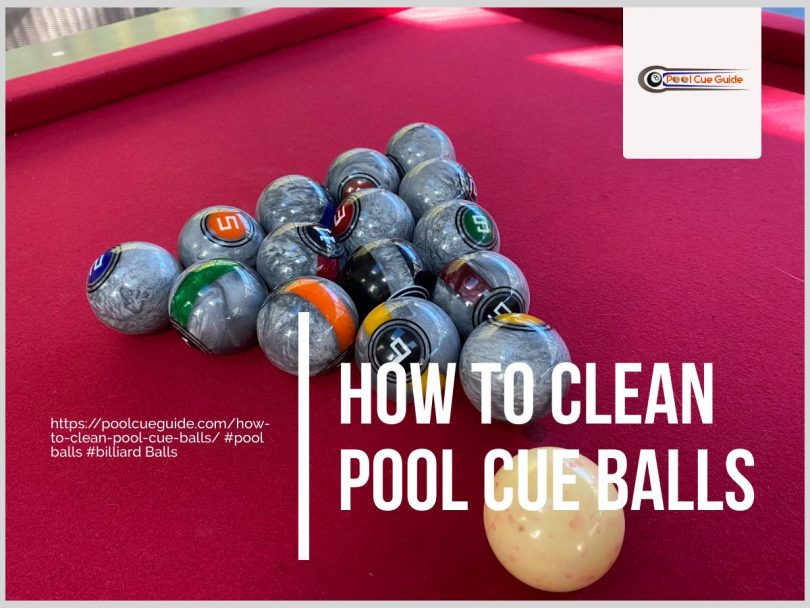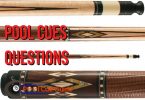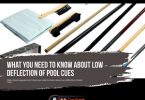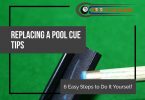Anybody who has played pool in a filthy pub or any billiard facility understands how irritating it could be to play on unclean, lack of maintenance gear. Cleaning your pool balls and finding the set of pool balls price is a vital but frequently ignored aspect of keeping your house billiards equipment in good working order.
Dirt, debris, and grease from mishandling, as well as chalk, may transform your shiny pool balls into rust-colored, off-color eyesores, as well as shorten the life of your pool table’s feeling surface and the balls themselves.
Throughout playing pool, dirt and filth on the balls might be transmitted to your pool tabletop. Such contaminants may cement permanently in the material, necessitating more frequent table-surface washing and ultimately needing costly replacements.
Mud and contaminants embedded in the material could also have a detrimental impact on the table’s functioning by altering the direction of the balls’ travel along a changed surface.
Damaged balls could also produce mass asymmetries which impact ball control; a ball that is not nice and smooth would not travel in the appropriate path completely. Discrepancies in pool ball textures exacerbate the problem by altering the cue-contact balls with the target balls, influencing each stroke you make.
We’ll teach you How to Clean Your Pool Balls in this step-by-step guide of ours. The techniques and guidelines for cleansing your billiard balls, as well as a few product recommendations like diamond billiard balls, are included below, but before that, let’s look at some certain things you should not do.
Content Navigation
How Should You Not Clean Your Pool Balls
Although cleansing your pool balls might not even appear to be difficult, there are some ways you must avoid, like the plague. Techniques that have the potential to do more harm than benefit. Here are some pool ball cleaning methods which should be avoided at all costs.
● Avoid Household Cleaning Products
Windex or Simple Green might appear to be ideal alternatives for shining your pool balls, but they can be harsh and harmful to the ball skin. Such goods might also cause you to travel in the reverse way of your desired outcome.
Many people advocate CLR as a cleansing technique, although this has a reputation for turning balls orange. Bleach can also cause discoloration among the balls, ruining the polish and perhaps causing stains on the non-white parts and making the whiter portions yellow!
Toothpaste is also not suggested since it might create extra residues on the pool balls that washing may not remove and discolor.
● Dishwashing
Dishwashing your pool balls might appear to be an easy and inexpensive tool for cleaning them, but this can permanently harm them, totally killing your expensive hardware. Pool balls are commonly composed of polyester-resin or phenolic resin mixture. The heat generated during a dishwashing process has a significant influence on both components.
The exterior look and the core integrity of the pool balls would be affected when using a dishwasher. Even just a moderate temperature will diminish their luster and shorten their lifespan. As a result, it is never a good idea to put your pool balls in the dishwasher.
Why Clean Your Pool Balls at All?
Let us clarify why we should even be bothered cleaning pool balls as we get into the step-by-step guide on how to clean pool balls.
If cleaning your pool ball is still a source of worry for you, you’re likely unaware of the importance that a clean ball may provide. The following are among the advantages why you should constantly keep your cue balls neat and tidy:
- Act of Responsibility – The abrasive grit on the dirty balls shows the volume of friction between the two sides when they glide across the table’s piece of fabric. The cloth is more likely to rip as a consequence of the greater friction. Dust significantly reduces the speed and distance that balls may travel.
- Increased Pleasure to Play – Purity, of course, appeals. The pool ball follows the same concept. Once you have a pristine-looking ball, you would feel compelled to play pool since your attempts are commensurate with the outcome (easy and quickness of the ball).
- Dirty Balls Multiplies the Table’s Wear and Tear Risk – Because you play the ball frequently in locations with particles of dust, fatty food items, grease, and other contaminants, it falls to us to keep the balls fresh and well-polished.
- For Frictional Co-Efficiency – The transmission of wiggle from the cue ball to the target balls is the core mechanism of the pool game. The plot revolves around this technique. A friction coefficient element between the pool balls is required to do this successfully. Clear balls are the only way to ensure a sufficient degree of co-efficiency.
How to Clean Pool Balls?
We’re sure you’ll find many techniques for cleaning pool balls on the internet; nevertheless, a few of those procedures can wind up harming your balls. This article is devoted to teaching you how to clean your pool balls without damaging anything.
Given our personal experience, there are two techniques for keeping your pool ball spotless: a professional polish and soap and water.
It’s even beneficial to understand that all these alternative approaches are simple, inexpensive, and successful.
As we discuss these approaches, keep in mind that the sort of pool balls you choose will affect the strategy you employ to a great extent.
- You can use warmer water for resin-based pool balls.
- Employ lukewarm water for polyester-based pool balls.
To figure out how to clean pool balls, you’ll first have to determine the kind of pool balls you possess, as warmer water will affect polyester and acrylic pool balls. If you’re not sure, start with lukewarm water.
1. Using A Professional Pool Ball Cleaners
Many people will find the soap and wash technique too time-consuming due to the processes required to opt for the second. You would want to use this approach because some balls will not clean with soap and water alone.
Several fantastic, greater-quality pool ball cleaners can restore the appearance of your discolored pool balls. The Aramith’s pool ball cleaner is among these strongly advisable cleaners.
The cleaning chemical is formulated explicitly for phenolic resin balls; less expensive pool ball cleansers might not consistently achieve the same results. It is pretty effective in washing. You’ll need an Aramith ball cleanser, an Aramith ball restore, and two microfiber wipes to operate this Pool ball cleaner.
- Stir the Aramith pool ball cleaner well before using it to cleanse the pool ball you wish to start with.
- Clean the pool balls for 30 seconds to a few minutes prior to using this cleaning solution and one microfiber wipe.
- Thoroughly wipe the ball with another microfiber cloth, assuring no restorative is remaining on it.
- Then, with the Aramith ball cleaner now, do it all over again. Stir things up, put them on the pool ball, buff them, and then dry them.
The restorer should always be used well before Aramith cleaner. The explanation for this is that this is the more powerful of the two chemicals, so it assists in the breakdown of stubborn dirt before the cleaner eliminates them.
2. A Mixture of Soap and Water
It’s practically second nature for you to consider soap and water if anything needs to be cleaned. If you’ve ever considered using this combination to wash your pool balls, you’re not alone; it’s a simple and efficient approach.
You would, nevertheless, require the following items to utilize this procedure to cleanse your pool balls.
- You will need two buckets.
- Warm water OR hot water for polyester and resin-based balls.
- Soap or detergent
- A microfiber cloth and a dry fluffy towel
The following processes will show you how to apply this approach successfully:
- First, fill one of the buckets with lukewarm or hot water, then pour some mild soap and stir thoroughly.
- Wash the balls by soaking them in the water for at least ten minutes. Fill the other container with chilly or medium water temperature, whereas the balls are submerged.
- Separate the wet pool balls after around 10 minutes and dry them clean with the microfiber towel. You may apply more detergent to the soft microfiber cloth to guarantee that these balls light up.
- Next, clean the detergent off these balls in another container using cold water. Rinse the balls dry once they’ve been washed.
Whenever you come in contact with the balls, make sure they’re completely dry. Keeping them half-dry might cause significant harm to the balls. It’s a frequent blunder committed by a few individuals, particularly when washing their pool balls for the first time; don’t make the same error.
● Polyester-Based Balls
While washing polyester-based billiard balls, a different washing method is used. These can’t be cleaned in the dishwasher since they’re made of polyester.
While compared to Aramith balls, these demand a little more concentration, especially while cleaning. A sponge, soft lean cloth, a gentle soap, and warm water, with a bit of pressure, are all you’ll need to clean those balls.
Following washing the stains, make sure the ball is free of any washing residue. Any remaining detergent on the ball might create a shimmery residue.
Clean the balls using a microfiber cloth and some ball varnish for bringing out their brilliance even more. The Tiger Ball polisher is an illustration of various industrial ball polishers to utilize.
● Resin-Based Balls
The resin-based pool balls behave precisely like regular glassware in any washer, but especially in the dishwasher. That implies they’re straightforward to wash in the dishwasher. Therefore, the dishwasher will do just well; avoid using strong detergents.
Harsh soaps often used to remove pot marks and significant grease marks may damage the balls’ glossy sheen, creating dents and blemishes. When using a dishwasher, make doubly sure to separate your pool balls.
The cleaning procedures outlined above are acceptable; the only distinction would be that resin-based pool balls could be cleaned with warmer water compared to polyester-based pool balls.
How to Clean Yellow Pool Balls?
The most common stain observed on pool balls is a yellow tint. It renders the balls, particularly the cue ball, appear older, filthy, and unattractive. Why do pool balls turn yellow, though?
The discoloration appears as a result of oxidation on the surface.
It’s comparable to the rusting that materials endure.
Since it appears to be challenging to remove, this discoloration causes many difficulties for so many pool gear users.
How to Prevent Your Pool Balls from Turning Yellow?
Beyond the proper taking care of your pool balls and properly storing them, there isn’t much you can do to avoid discoloration.
Here are a few suggestions for keeping your pool balls from turning yellow:
- Put these in a container with a cover to keep them safe.
- And keep them clean and fresh.
- Protect the case out of direct sunlight and away from extreme temperatures.
These techniques may assist to prevent pool balls from yellowing, but the balls will still be yellow eventually.
Now, what’s the best way to clean yellow pool balls?
You may eliminate the yellow stain using any of the ways listed previously, including the standard household cleaning procedure and the ball polishing.
We would apply Aramith pool ball Restorer firstly, next polish with a microfiber cloth for resin-balls like Aramith. Make doubly sure there’s no restorative remaining on the ball.
Next, utilizing Aramith Billiard Ball Cleaner, continue the cycle.
We would follow the procedures explained above for polyester-based balls, and we will instill some baking soda into the soap solution and wash the balls this way.
The most important fact to notice is to be well-versed in the sort of ball you’re washing. Pool balls are damaged whenever the incorrect tools and chemicals are used to cleanse them.
What is the Best Way to Clean and Polish the Pool Balls?
A ball cleaner and polisher, on the other hand, is a process that requires considerably lesser work yet comes at a higher cost.
These are some of the most fantastic billiard ball cleaners and polishers on the marketplace and among them is the Ballstar Billiard Ball Cleaner and Polisher. It cleans and buffs your pool balls with its powerful engines. It will not, however, remove the solid markings.
Strong stains on your billiard balls should not occur, provided you take proper care of them. However, when they do occur, a little elbow grease can restore it to its former glory.
This is undoubtedly the proper technique to clean pool balls when you don’t enjoy washing them yourself. It’s simple, rapid, and painless.
What’s nice about it is that the equipment polishes the balls to ensure that they are spotless and shiny. However, it will cost slightly extra, so it is entirely up to you and your financial situation.
How to Polish Pool Balls?
The most significant fact is to clean pool balls if and when necessary; polishing them is an extra benefit, although it isn’t always required.
The billiard balls, on the other hand, look fantastic beneath the table lighting whenever they sparkle.
In reality, the WPA opposes waxed pool balls for competitive games, claiming that it alters how the pool balls move and engage.
However, should you persist in waxing your pool balls to make them sparkle like new, there are some options:
- Cleanse and polish your balls with pool ball cleaning/polishing equipment.
- Applying polish, rub them gently with a microfiber cloth.
- Applying wax, rub them gently with a microfiber cloth.
While it isn’t recommended because it will affect the way the balls move somewhat, and you won’t be establishing genuine competition standards, you may need to go ahead and polish the balls.
Here are all the methods to waxing or polishing your pool balls to make them seem fresh again:
- Add a very light coating of wax or polish on your pool ball using a little quantity of wax or polish (one or two droplets).
- Massage in the wax or polish with a microfiber cloth, being careful to saturate the entire area of the ball softly yet securely.
- Allow it dry for a few minutes before buffing the ball with a soft microfiber in circular movements, taking care to polish the entire ball.
It should make the ball gleaming and spotless.
Final Thoughts
We are hopeful that you have learned how to clean pool balls properly, so that filthy pool balls cause no harm by going through this article.
If we don’t ensure the appropriate maintenance of them, you may find yourself needing to purchase a new pool table, material, or other gear earlier than you anticipated. Therefore, to live a long and healthy life, you must take good care of just about everything.
The techniques listed above will help you clean your pool balls, such as the cue ball, without affecting their integrity. Washing your pool balls must be done routinely.
This would reduce the risk of dirt accumulating on the balls and the pool table, causing harm.
You may flaunt your billiard table to your friends if you maintain things neat and beautiful. And then, once you’ve wowed people with the set-up, all you have to do now is impress them with your pool abilities.
Now that you have clean and pretty pool balls, it only makes sense to use them while performing during those challenging and fascinating pool matches.
Self Professed Geek , into all kinds of tech including search engine optimization , Computer networks and more. I love playing pool ( eight ball , nine ball and snooker) I own my own pool table a play daily. I love to try out new pool cues and accessories. read my review of actual pool cue i have used and use often.








